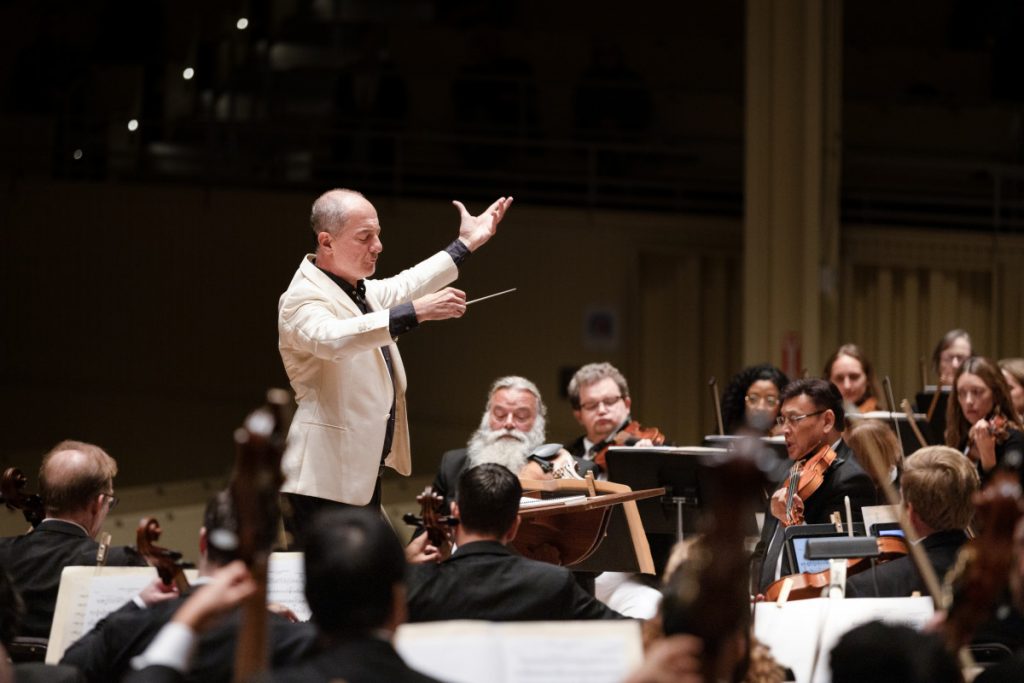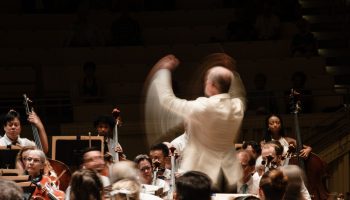
Gabriel Weber
Staff Writer
In a night of “Classical Remix,” soloists and oboists Jaren Atherholt and Noah Kay will play a quirky piece akin to an acting assignment amidst a program blending old and new.
At 8:15 p.m. tonight in the Amphitheater, Music Director and Principal Symphonic Conductor Rossen Milanov leads the Chautauqua Symphony Orchestra to Wolfgang Amadeus Mozart’s Idomeneo Ballet Music; Viet Cuong’s “Extra(ordinarily) Fancy” Concerto for Two Oboes and Orchestra; Anna Clyne’s “This Moment”; and Franz Schubert’s Symphony No. 3, D. 200.
Milanov co-commissioned “This Moment” as music director of the Columbus Symphony Orchestra with a number of other orchestras; it is, he said, a wonderful and interesting work.
“It’s been based on Zen Buddhism and the art of being present at the moment, as opposed to relying on your memories or your dreams for the future,” Milanov said. “What she chose to do in the piece — which is really colorful and very well-orchestrated — is quote a few lines from Mozart’s ‘Requiem,’ which was an interesting choice.”
The Mozart piece is paralleled by “This Moment” in that, however different, they relate as Clyne chose to integrate musical material from “Requiem.” Meanwhile, rounding out the program, Schubert composed the Third Symphony at 18 years old; with one foot in the classical style like Mozart and one foot in the Romantic period, the piece is forward-thinking and unique, Milanov said.
Composed in 2019, “Extra(ordinarily) Fancy” is incredibly charming, fun, full of character and life, said principal oboist Atherholt. While the audience will likely enjoy listening and not hear the technical difficulty of the piece, that difficulty is significant.
“When you hear the piece, you’re not going to hear technical difficulty,” Atherholt said. “You’re just going to enjoy and have fun listening. Meanwhile, (Kay) and I are working so hard for the enjoyment and the quirk.”
Written as an exploration into the techniques that an oboe produces, “Extra(ordinarily) Fancy” starts off with a kind of Vivaldi-type concerto in reference to older styles, while still looking forward.
“The whole premise of the piece is that these two oboists are going to have like a mini competition, and they’re going to try to undo each other using both the traditional, beautiful oboe type of playing that we know from most of the orchestral music. Always when the oboe has a solo, it’s something very meaningful and most of the time lyrical and interesting,” Milanov said. “It’s designed as a kind of mini sketch, like a little comedy routine.”
Oboists’ typical type of playing is deeply expressive, and while that is the case for this concert, there is another level of imagination within the musicality.
“The oboe is definitely known for sorrowful, sort of mournful and sweet-sounding solos. I definitely enjoy getting to learn these new fingerings. It’s nice that it’s outside of the box, and I think it’s really inventive writing,” Kay said. “He found a way to make the humor very clear in this piece.”
As the Cuong work is so demanding for the oboists, they’ll have supplementary instrumentalists for the other three pieces: English horn player and oboist in the CSO Adam Dinitz will be principal, and the other two oboes are Anna Mattix with the Buffalo Philharmonic Orchestra and Stefani Wilkinson with the Butler County Symphony Orchestra.
The challenges lie in the extended techniques, which are outside of their usual range; extended techniques include timbral trills, double trills and multiphonics. Timbral and double trills involve not covering the keys completely to create different pitch and tone, then using multiple fingers to trill. Multiphonics are entirely new fingerings that produce multiple tones sounding at the same time, which play a big role in the composition.
“We start the piece playing together, and it’s almost like a mock-Baroque kind of effect. Then, it very quickly becomes (Atherholt) acting as the serious, buttoned-up orchestral oboe player. So she’ll play something, and then I’ll sort of imitate or mock the line that she plays using multiphonics,” Kay said. “I think it is pretty brilliant with the multiphonics because he actually calls for pitched multiphonics.”
Part of what draws Atherholt to oboe has always been the challenge; she was the type of kid who tended to pick the most obscure and demanding research topics. Usually the school didn’t allow children to start on oboe since the double reed was so challenging, but Atherholt started on oboe in fourth grade and picked it up quickly.
Kay found the oboe in a more roundabout way, as his musician parents started him on piano at about 7 years old, before he jumped to double bass. At 14 years old, he saw his dad’s chamber band, Orpheus, perform on tour in Europe and was immediately taken by the oboe’s sound, asking his dad at intermission if he could get lessons when they got home.
Practicing is a huge hurdle for most teenagers with musical aspirations, but for Kay, it has always been reed-making that is the beast, which worked out well because this piece required around 45 hours of practice for him. Atherholt and Kay make their reeds out of tubes of bamboo, searching for the right piece that will suit whatever piece they’re playing and the weather they’re playing in — made tougher still by the outdoor venue.
While Atherholt and Kay are performing only for “Extra(ordinarily) Fancy,” Kay is particularly excited to see Mozart’s Idomeneo as that was the piece that got him hooked on the oboe when he saw it performed by Orpheus. Influenced and inspired by past traditions, musicians and new music get to build on the excellence that already exists.
“The idea of this concert is that it’s one of the last opportunities for us to look at works from the classical style, older music and new music that has been infiltrated by older ideas,” Milanov said.




